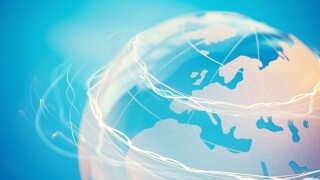Nicol Nógrádi at industry newcomer Inter.link explains how having a green ethos at heart brings big benefits.
Digital technologies use a huge amount of energy, with the internet accounting for around 4% of global carbon emissions. While the continued growth in traffic is clearly great for business, the flip side is that the figure is set to go on rising unless the industry significantly strengthens its push towards sustainability.
Although many forecasts have painted a bleak picture for the climate of the future, the good news is that awareness of the need for sustainable growth is also continuing to rise.
“There’s definitely been a big increase in industry conversations on the topic of sustainability and how to do things going forward,” says Nicol Nógrádi, special projects manager at Germany-based international carrier Inter.link. “There’s a lot of room for improvement, but I would say the direction is good.”
She also points to the likes of EU regulations that entered into force this year strengthening rules for reporting on corporate sustainability.
Intrinsic motivation
With all this in mind, Inter.link is seeking to disrupt the network industry following its official launch this October. Co-founded two years ago by Theo Voss and Marc Korthaus, the two kicked things off by acquiring the network assets of German hosting and cloud company SysEleven and its 15 European points of presence. They then set about their plan of adding more PoPs globally, with Inter.link having around 25 now and aiming for 35 by the end of the year.
“The founders saw that to disrupt the industry at a digital level, it’s important to build a sustainable business – so for them it was an intrinsic motivation,” says Nógrádi. “There are also lots of trends showing that customers are more willing to purchase from you if you’re sustainable and you’re more likely to get funding.”
She adds that Inter.link gains from having sustainable processes incorporated from the company’s inception. “What’s unique with us is we don’t have to drive that much inner change because we consciously built a lot of those processes into the business from the start,” says Nógrádi.
Among methods to achieve its sustainability goals, Inter.link’s carbon-emission measurements are automated. The company also works closely with suppliers throughout the product lifecycle to keep emissions to a minimum and is looking to become net-zero for emissions by 2025, after being carbon-neutral last year. On top of that, the company is using 20% more renewable energy in the carrier-neutral data centres where it operates this year than in 2022.
In addition, the company is part of non-profit global initiative the SME Climate Hub and was recently granted B Corp certification, awarded to organisations that meet high standards of social and environmental performance, transparency and accountability. “That certification was a big goal of ours because it’s a 360-degree look at the company in terms of how you treat everything, including the environment, governance and workers,” says Nógrádi.
She highlights, meanwhile, that although the environment is clearly a fundamental part of sustainability, there’s more to it than that. “It’s also a more holistic approach of providing the source of inspiration to build a business that can be there for the long term,” she says.
Scaling sustainability
But can Inter.link maintain its sustainable ethos as it builds out, with the company rapidly scaling up? Nógrádi concedes that this is a challenge, but that it can be overcome by mapping everything out to begin with to identify potential emissions hotspots and be ready for action. “Many of those initial hurdles can be overcome by putting the right processes in place from the get-go,” she says.
A large part of achieving this goal is also about ensuring that partners and suppliers share the same values as Inter.link. This was the case with the recent partnership deal the firm struck with Western European bandwidth infrastructure company euNetworks, which forms a key pillar for supporting Inter.link’s international expansion plans. “euNetworks is also raising the bar significantly when it comes to sustainability,” says Nógrádi. “It has very ambitious goals that align really well with our own.”
She highlights that having a sustainable approach that’s clearly evident to others can drive new innovative link-ups. “If a company is really conscious about its supply chain, it’s more likely to partner with those that share the same values,” she says.





